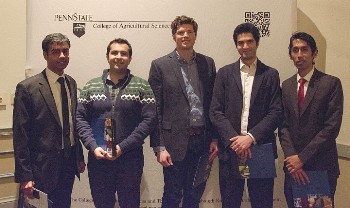Apr 18 2014
A five-student team known as "Leafy," marketing a wireless sensor that detects moisture directly from plant leaves, won the $7,500 first-place prize April 10 in Ag Springboard 2014, a student business plan competition designed to spark and nurture innovation in agriculture.
 Team "Leafy" won the 2014 Ag Springboard student entrepreneurship competition for its plant-moisture sensor technology. Image: Penn State
Team "Leafy" won the 2014 Ag Springboard student entrepreneurship competition for its plant-moisture sensor technology. Image: Penn State
The Entrepreneurship and Innovation Program in Penn State's College of Agricultural Sciences sponsors the Ag Springboard event, with the support of benefactors Earl and Kay Harbaugh, lead donors for the program.
Five finalist teams presented their business plans throughout the day's final round to a panel of entrepreneur judges familiar with the food, agriculture and biorenewable energy sectors.
The Leafy team's plant moisture sensors attach directly to plant leaves without damaging them and use technology that makes them more accurate than other devices that measure moisture from parts of plants, said Amin Afzal, graduate student in agronomy, who invented the device.
"It's a great win and an opening of new opportunities for me," said Afzal. "It's a turning point -- a switch from the academic to commercialization."
Farmers can use the sensors, which integrate with crop-management software, to optimize crop irrigation. Afzal studied agricultural machinery engineering at the Esfahan University of Technology in Esfahan, Iran. He has developed the plant sensor over the past decade and is in the process of patenting it.
For Ag Springboard, he worked with four master of business administration students -- Masoud Ghayoumi, Iqbal Asim, Marcus Cullen and Ankit Mahajan -- on finance, marketing and distribution plans to develop strategies toward commercialization.
Based on an analysis of acres of U.S. cropland in drought-affected areas, such as California's Central Valley, Leafy estimates potential sales of more than $1 billion.
Leafy's presentation was impressive, noted Mark Gagnon, Harbaugh Entrepreneurship Scholar and the college's entrepreneurship coordinator. "They took this technology that Amin has been working on for 10 years and developed and packaged it into an extremely compelling business case," he said.
Gagnon explained that this competition wasn't just an academic exercise. "This team has the makings of a profitable, viable business."
As he announced winners, College of Agricultural Sciences alumnus Earl Harbaugh, creator of five Illinois businesses including Ditch Witch Midwest, said the team presentations were outstanding, and judges struggled with a close call between first and second place. The runner-up team was Vine Roofs, which offers vegetative roofs at a lower cost than conventional green roofs.
The caliber of the teams and their presentations has increased significantly from prior Ag Springboard competitions, according to Gagnon. "We're starting to build a following of students who are growing active companies and ventures from Ag Springboard," he said. "Students are building on the momentum and creating companies and nonprofits."
Previous winners of Ag Springboard spoke during the evening's festivities, including members of Green Towers, which is working to create consumer-friendly hydroponics products. In addition, Fengchun Yang described his experience learning and exploring business opportunities with the larvae of black soldier flies.
Anne Yorks, CEO of Flour Box Bakery in Zion, described the creation and success of her custom cookie-decorating business -- without taking on debt.
"We started slow and small and used any opportunity to re-invest in the business," said Yorks, who related how she and her husband worked with friends and family over time to convert her two-car garage into a bakery, doing a lot of the work themselves to save money.